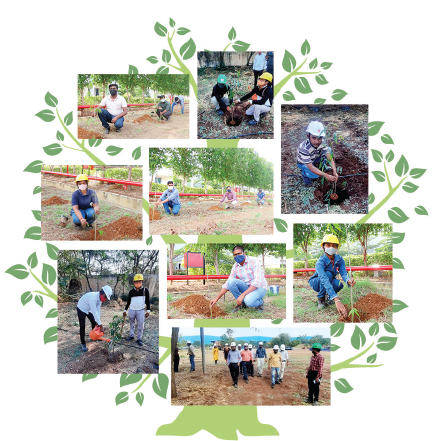
 NATURAL CAPITAL
NATURAL CAPITALAs a clean air, clean energy and clean water company, we realise how significant our role is in promoting sustainable development. The sustainable solutions we develop for our customers are environment-friendly and enable efficient deployment of energy and water resources. We are committed to creating greener products and manufacturing sustainably by way of resource conservation and energy efficiency.
Capex on carbon footprint
reduction related projects
Number of saplings planted
SO1
SO2
SO3

At Thermax, we remain focussed on sustainable energy and environmental solutions. Our offerings in waste heat recovery, bio-fuels, solar, bio-CNG and waste-to-energy demonstrate our commitment towards delivering clean energy. Sustainability has been inculcated in every process. A keen focus on sustainable technologies helps reduce operating costs and increase our operational efficiencies. Adequate measures are being taken to ensure our manufacturing operations make judicious use of the natural resources.
We understand the need to boost our capabilities in green energy and strengthen our efforts towards a cleaner India. During the year, we also enhanced our renewable energy portfolio by expanding our solar business through First Energy Private Limited.
At the World Leaders Summit of UN Climate Change Conference, Glasgow (COP26) in November 2021, countries reaffirmed the Paris Agreement goal of cutting greenhouse gas emissions. It was reiterated to limit the increase in global average temperature to well below 2 degree celsius above pre-industrial levels and pursuing efforts to limit it to 1.5 degree celsius. India has committed to being net-zero by 2070. It has announced plans to reach 500 GW non-fossil energy capacity by 2030, with 50% of its energy requirement from renewable energy.
We have disclosed our commitment to reduce 25% of our absolute carbon emissions from base year 2019 by 2025. To achieve this goal, four key areas have been identified – operational efficiency, addition to renewable energy generation, renewable energy procurement and fuel switch. This year, we commissioned most of our projects related to operational efficiency and contributed towards the reduction in carbon emissions. A solar rooftop energy generation project of 930 kWp capacity was installed at the Sri City plant, which is estimated to start generating power in FY 2022-23. From the base year, our carbon emission intensity with respect to revenue has improved by 12.96%.
We are constantly working on increasing our dependence on renewable energy across locations. We aim to procure renewable energy through open access at Chinchwad, Paudh and Shirwal plants. We have also set up rooftop solar panels for power generation with installation capacity of 2.17 MWp at Savli, Jhagadia, Sri City plants, and at our offices in Pune. The installed solar rooftop power projects have generated renewable energy of 5,76,000 kWh in FY 2021-22, resulting in emission avoidance of 455 tCO2e. We are also in the process of liasioning with authorities for switching our existing natural gas fuel to biomass fuel at our chemical plant in Dahej.
Renewable energy consumption
Non-renewable energy consumption
Energy savings
Emission savings
Our primary source of water is utility supply. However, rainwater harvesting is helping us reduce our dependence on freshwater. During the year, rainwater harvesting initiatives at Paudh, Jhagadia, Dahej, Sri City plants, and at two of our offices in Pune resulted in storage, consumption and groundwater recharge of rainwater.
Water consumption
Rainwater harvested
Water reused and recycled
We follow a reduce, reuse and recycle concept at eight of our zero wastewater discharge manufacturing plants. Regular monitoring of wastewater is done by internal and external agencies on parameters like chemical oxygen demand (COD), biological oxygen demand (BOD) and pH. These values are within adherence of the guidelines and limits defined by the State Pollution Control Board and local regulatory authorities. The treated effluents are utilised internally for gardening, fire hydrant system and flushing purposes, resulting in the recycling and reuse of wastewater.
On the occasion of World Environment Day on June 5, our employees planted saplings at several manufacturing locations and at a few of the customer sites. As a part of the celebrations, various events and campaigns such as a quiz contest, digital collage making contest, seminars, environment surveys, and plantation activities were conducted based on the theme of ‘Ecosystem Restoration’.
#ZeroWeGo is a sustainability campaign kickstarted during the year by Thermax Cooling. The key purpose of this campaign is to steer the world towards a greener and sustainable tomorrow. ‘Zero We Go Day’ has been instituted on January 28, 2022, encouraging citizens to adopt sustainable practices. The sustainability initiative resonates with the company’s passion to reimagine, recreate and restore the environment by reducing carbon emissions – both internally and for our customers.
Whether it is through our processes, products or premises, we are making a conscious effort every single day and empowering ourselves towards environment conservation and preserving the nature. We conducted webinars and workshops to sensitise our employees on key topics. An e-waste collection drive was organised at Pune, where 607 kg of household e-waste was collected and disposed through an authorised agency.

Thermax conforms to all the environmental laws, regulations and standards for environmental conservation
All our factories comply with the permissible limits of ambient air quality with key parameters including PM 2.5, PM 10, SOx and NOx as prescribed by the Central Pollution Control Board (CPCB) and State Pollution Control Boards (SPCBs)
Waste generated at manufacturing sites is segregated as hazardous and non-hazardous waste which is handed over to collection vendors; and later disposed, recycled or reused as applicable in a socially responsible and environmentally safe manner
Thermax has installed electric vehicle charging points for its employees with convenient and accessible charging stations at Chinchwad (PCMC) at an affordable cost, thus enhancing employee experience and sustainability quotient.


